网考大学英语B统考题型及分值
统考大学英语B考试技巧 精品

本次考试采用全新的2010年新版大纲,考试题型和内容跟以往均有所不同,考试题型和分值为下图所示:模拟题由原先的大学英语(B)模拟试卷6套(2007年修订版)改为大学英语(B)模拟试卷9套(2010年修订版),题目的范围及重点发生了一些变化,相对来说难度下调,1.交际英语,5题15分,此部分与以前没有太多变化,更加注重测试考生在日常生活情景中的交际能力,单词较简单,将此部分题库熟读几次,将可以拿到15分满分。
2.阅读理解,2篇短文,满分30分。
第一篇短文改为正误判断题,投机几率加大,较易得分。
一般是根据文章的事实或细节,给出一个句子,判断其正误。
比较直接,难度相对较小。
做此类题时,应先看题,后带着―问题‖快速阅读短文,寻找所需要的信息. 第二篇短文为2010年9套模拟题中的18篇阅读理解中选择一篇,15分等于白送,此部分完全可以拿到20分以上。
3.词汇与结构,5题10分,新版大纲降低了此部分的分值,对于基础较差的同学来说是个好事,此部分突击起来有一定难度,如果基础不是很好,可以重点看一些题目即可,拿下2题就可以了,此部分预计分数4分。
4.完形填空,1篇短文,5空10分,新版大纲在完形填空上的改变较大,难度降低显而易见,5个单词填入5个的空白处,通过逻辑推理等方法或投机方法也可以对上1-2个5.英译汉,4题20分,新版大纲增加了此部分的分值,对于基础较差的同学又是一件好事,题库中基本包含了全部的考试题目,大家可以经常看看,熟悉英文的单词,然后记下汉语意思,考试的时候只要大概意思对上即可,所以此部分拿分要在15分以上。
6.写作,1题15分,此部分没有太大改变,大家有基础复习一些范文或是用WORD写点都没有太大问题,拿5分没有难度。
综上所述,2010年薪的考试大纲难度降低,只要进行一定的温习即可获得及格的分数。
能将资料用光盘或U盘带进考场拷入电脑最好,首推用光盘,不用弯腰,相对来说光盘限制的可能性小的多。
大学英语B级统考考试题型

容易得分的题型
交际用语(5小题×3分=15分)
词汇与结构(5小题×2分= 10 分)
翻译(4小题×5分= 2作特别提醒 是否可以用word文档?
1
有的考场禁止使用word文档。
2
有的考场虽然没有明确禁止,但在word文档中写好作文之后却不 能复制到考试系统里,不知情的同学因此浪费了很多时间---复 制不成,只好把在word文档中写好的作文又往考试系统中输入了 一遍,连检查修改的时间都没有了。
B
大 学 英 语 级 统 考
大学英语(B)试卷结构与题型
部分
项目
内容
题型
考点
时间 题量 (分钟)
听力理解 Ⅰ 1~24
问题、对话、听写
选择、填空
日常情景 交际能力
24% 2 5分钟
Ⅱ 词汇和语法25~39 词汇用法、句法结构、词形变化 单项选择、填空 理解主旨
等
具体信息
15% 10分钟
Ⅲ
阅读理解 40—62
3
过去也有同学使用Ctrl+V复制成功的。如 果考场没有明确禁止使用word文档,可以 自己先在word文档里写几个词试验复制一 下。
尽量争取多拿些分数的题型
阅读理解
2篇短文共10小题,每小题3分,满分30分. 其中一篇一定是蓝皮书上的,这15分是白送给我
们的!
完型填空
1篇短文共5小题,每小题2分,满分10分。 有的同学也会遇到蓝皮书上的。
做以上两种题时,绝对不能让选项空着不选。 如果实在不知答案,怎样猜答案呢?
选项是All of the above的,往往是答案; 选项字数特殊多的往往是答案;
重要材料
统考全真题(见学习系统-课程资源)
高校网络教育部全国统考“大学英语(B)”考试大纲及题型

试点高校网络教育部分公共基础课全国统一考试“大学英语(B)”考试大纲试点高校网络教育部分公共基础课全国统一考试,旨在遵循网络教育应用型人才的培养目标,针对从业人员继续教育的特点,重在检验学生掌握基础知识的水平及应用能力,全面提高现代远程高等学历教育的教学质量。
“大学英语”课程是现代远程教育试点高校网络教育实行全国统一考试的部分公共基础课之一。
该课程的考试是一种基础水平检测性考试,考试合格者应达到与成人高等教育本科相应的大学英语课程要求的水平。
考试对象教育部批准的现代远程教育试点高校网络教育学院和中央广播电视大学“人才培养模式改革和开放教育试点”项目中自2004年3月1日(含3月1日)以后入学的本科层次学历教育的学生,应参加网络教育部分公共基础课全国统一考试。
“大学英语(B)”考试大纲适用于除英语类和艺术类专业以外的其他专业高中起点与专科起点本科学生。
考试目标本考试旨在全面检查现代远程教育所有专业(除英语类和艺术类专业)的学生综合运用英语听、说、读、写各项技能的基本能力。
考生应掌握基本的英语语法知识和词汇,具备运用不同的阅读和听力技巧获取信息的能力以及用英语进行口头和笔头交际的基本能力。
考试内容与要求【语法】考生应掌握基本的英语语法知识,并能在听、说、读、写、译中较正确地加以运用。
【词汇】考生应认知3 000个单词,并熟练掌握其中的1 800个单词及其基本的搭配。
【听力】考生应能基本听懂日常生活以及社会生活中的一般性谈话,平均语速为每分钟110个单词。
考生应能:1.理解主旨要义;2.获取事实性的具体信息;3.理解说话者的意图、观点或态度。
【交际能力】考生应掌握日常生活常见情景中的基本交际用语。
【阅读】考生应能读懂与日常生活和社会生活相关的不同类型的文字材料,阅读速度为每分钟50个单词。
考生应能:1.理解主旨要义;2.理解文中具体信息;3.根据上下文推测生词词义;4.进行有关的判断、推理和引申,理解作者的意图、观点或态度。
统考大学英语B(含答案)(有中文翻译)

大学英语B——题型分类版内部资料(修订版)大学英语(B)网络统考复习指南亲爱的同学:为了顺利通过英语网络统考,请在复习前认真阅读复习指南和备考方案,端正态度,认真复习,争取一次通过考试,顺利获得毕业证!为了帮助同学们顺利通过考试,学校将提供以下资源:1. 统考复习资料“题型分类版”中的题目都是高频出现的历年真题,再次考到的几率非常大,所以请务必完全掌握!2018年9月起,考试形式发生变化,选项顺序会发生变化,所以请务必记住具体答案,不能简单背诵ABCD。
2. 考试形式英语统考的考试形式为上机考试,随机抽题。
所以请务必记住复习资料中每一道题的答案,并在电脑上练习中英文输入,为统考做充分准备。
3 备考时间英语统考不属于冲刺类考试,仅靠考前几天冲刺不能保证通过考试。
考前两周左右至少要将本复习资料看完一遍,并将练考系统所有试题至少做一遍,这样才能保证顺利通过考试。
认真坚持复习一个月,必定会有丰厚的汇报。
期待您顺利通过的好消息!附:大学英语(B) 试卷结构与题型《大学英语B》备考方案《大学英语B》备考一定要熟背“题型分类版”内部资料,复习资料含有大量的历年考试真题,再次考到的可能性很大!据历次考试的同学反馈,考试大部分是这份资料中的原题,因此请务必用心复习,熟练掌握每一道题的答案。
其中重点复习“英译汉”、“交际用语”、“词汇与语法”、和“阅读理解(单项选择)”,这4个题型都是最容易得分的题型,也是通过统考的关键。
考试题型介绍:1. 交际用语本部分考5道小题,共15分。
题目均为日常生活用语,是考试中最简单、规律性最强的题型,在微视频中老师详细讲解了每个场景的答题规律和技巧,认真观看微视频,看一遍就能记住答案。
本部分每题3分,分值较高,建议全部掌握资料题目,至少得12分,争取得满分15分。
2. 阅读理解本部分考两篇文章。
第1篇是阅读理解正误判断(AB两个选项),5道题,共10分。
大部分为细节题,可根据题干中关键字回归原文分析后选择答案。
2022年英语b级分数匹配
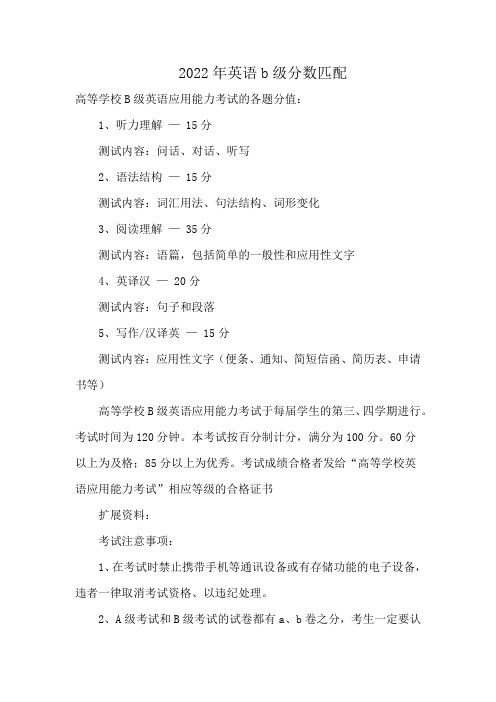
2022年英语b级分数匹配
高等学校B级英语应用能力考试的各题分值:
1、听力理解— 15分
测试内容:问话、对话、听写
2、语法结构— 15分
测试内容:词汇用法、句法结构、词形变化
3、阅读理解— 35分
测试内容:语篇,包括简单的一般性和应用性文字
4、英译汉— 20分
测试内容:句子和段落
5、写作/汉译英— 15分
测试内容:应用性文字(便条、通知、简短信函、简历表、申请书等)
高等学校B级英语应用能力考试于每届学生的第三、四学期进行。
考试时间为120分钟。
本考试按百分制计分,满分为100分。
60分
以上为及格;85分以上为优秀。
考试成绩合格者发给“高等学校英
语应用能力考试”相应等级的合格证书
扩展资料:
考试注意事项:
1、在考试时禁止携带手机等通讯设备或有存储功能的电子设备,违者一律取消考试资格、以违纪处理。
2、A级考试和B级考试的试卷都有a、b卷之分,考生一定要认
真核对自己考的是a卷还是b卷,然后再在答题卡上涂好a卷还是b 卷的标记。
3、答题一定要在答题卡作答,答案写在试卷上是无效的,注意把握好考试时间。
4、由于采用了正反面的答题卡,一要注意在规定的范围作答,超出范围的作答算作无效;二要注意切勿折叠、损坏答题卡。
大学英语b级分值
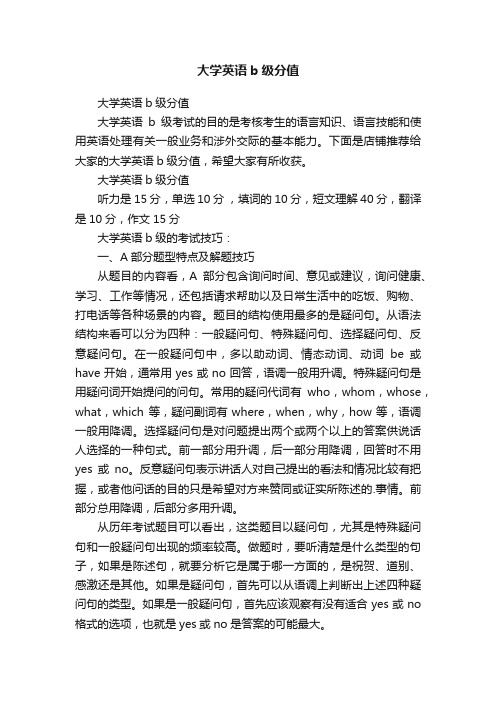
大学英语b级分值大学英语b级分值大学英语b级考试的目的是考核考生的语言知识、语言技能和使用英语处理有关一般业务和涉外交际的基本能力。
下面是店铺推荐给大家的大学英语b级分值,希望大家有所收获。
大学英语b级分值听力是15分,单选10分,填词的10分,短文理解40分,翻译是10分,作文15分大学英语b级的考试技巧:一、A部分题型特点及解题技巧从题目的内容看,A部分包含询问时间、意见或建议,询问健康、学习、工作等情况,还包括请求帮助以及日常生活中的吃饭、购物、打电话等各种场景的内容。
题目的结构使用最多的是疑问句。
从语法结构来看可以分为四种:一般疑问句、特殊疑问句、选择疑问句、反意疑问句。
在一般疑问句中,多以助动词、情态动词、动词be或have开始,通常用yes或no回答,语调一般用升调。
特殊疑问句是用疑问词开始提问的问句。
常用的疑问代词有who,whom,whose,what,which 等,疑问副词有where,when,why,how等,语调一般用降调。
选择疑问句是对问题提出两个或两个以上的答案供说话人选择的一种句式。
前一部分用升调,后一部分用降调,回答时不用yes或no。
反意疑问句表示讲话人对自己提出的看法和情况比较有把握,或者他问话的目的只是希望对方来赞同或证实所陈述的.事情。
前部分总用降调,后部分多用升调。
从历年考试题目可以看出,这类题目以疑问句,尤其是特殊疑问句和一般疑问句出现的频率较高。
做题时,要听清楚是什么类型的句子,如果是陈述句,就要分析它是属于哪一方面的,是祝贺、道别、感激还是其他。
如果是疑问句,首先可以从语调上判断出上述四种疑问句的类型。
如果是一般疑问句,首先应该观察有没有适合yes或no 格式的选项,也就是yes或no是答案的可能最大。
如,Hello,may I speak to Helen?A.Yes,speaking.B.You are welcome.C.I am sure.D.I like it very much.此题是测试一般疑问句的典型句型,考查由may引导的疑问句的理解和应答能力。
网络教育大学英语B统考试题库
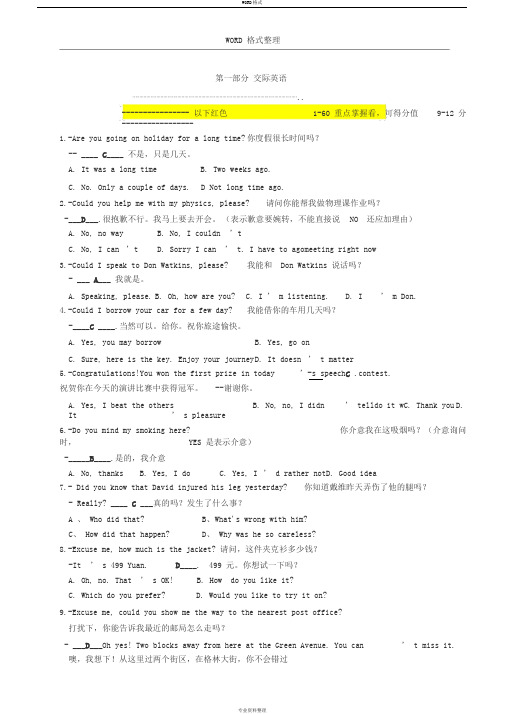
WORD 格式整理第一部分交际英语⋯⋯⋯⋯⋯⋯⋯⋯⋯⋯⋯⋯⋯⋯⋯⋯⋯⋯⋯⋯⋯⋯⋯⋯⋯⋯⋯⋯⋯⋯⋯⋯⋯⋯⋯⋯⋯⋯⋯..---------------- 以下红色1-60 重点掌握看,可得分值9-12 分-----------------1.-Are you going on holiday for a long time? 你度假很长时间吗?-- ____ C____ 不是,只是几天。
A. It was a long timeB. Two weeks ago.C. No. Only a couple of days. D Not long time ago.2.-Could you help me with my physics, please? 请问你能帮我做物理课作业吗?-___D___.很抱歉不行。
我马上要去开会。
(表示歉意要婉转,不能直接说NO 还应加理由)A. No, no wayB. No, I couldn ’tC. No, I can ’tD. Sorry I can ’ t. I have to agomeeting right now3.-Could I speak to Don Watkins, please? 我能和 Don Watkins 说话吗?- ___ A___ 我就是。
A. Speaking, please.B. Oh, how are you?C. I ’ m listening.D. I ’ m Don.4.-Could I borrow your car for a few day? 我能借你的车用几天吗?-____C ____.当然可以。
给你。
祝你旅途愉快。
A. Yes, you may borrowB. Yes, go onC. Sure, here is the key. Enjoy your journeyD. It doesn ’ t matter5.-Congratulations!You won the first prize in today ’-s speech C .contest.祝贺你在今天的演讲比赛中获得冠军。
北京师范大学网络教育大学英语B考试大纲
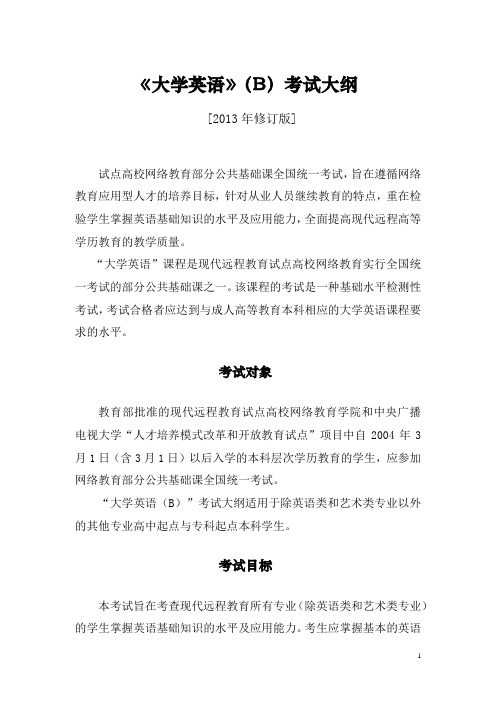
《大学英语》(B)考试大纲[2013年修订版]试点高校网络教育部分公共基础课全国统一考试,旨在遵循网络教育应用型人才的培养目标,针对从业人员继续教育的特点,重在检验学生掌握英语基础知识的水平及应用能力,全面提高现代远程高等学历教育的教学质量。
“大学英语”课程是现代远程教育试点高校网络教育实行全国统一考试的部分公共基础课之一。
该课程的考试是一种基础水平检测性考试,考试合格者应达到与成人高等教育本科相应的大学英语课程要求的水平。
考试对象教育部批准的现代远程教育试点高校网络教育学院和中央广播电视大学“人才培养模式改革和开放教育试点”项目中自2004年3月1日(含3月1日)以后入学的本科层次学历教育的学生,应参加网络教育部分公共基础课全国统一考试。
“大学英语(B)”考试大纲适用于除英语类和艺术类专业以外的其他专业高中起点与专科起点本科学生。
考试目标本考试旨在考查现代远程教育所有专业(除英语类和艺术类专业)的学生掌握英语基础知识的水平及应用能力。
考生应掌握基本的英语语法知识和词汇,具备运用不同语言技能进行交际的基本能力。
考试内容与要求【语法】考生应较好地掌握基本的英语语法知识,并能在交际中较正确地加以运用。
【词汇】考生应认知3000个单词,并熟练掌握其中的1 800个单词及其基本的搭配。
【交际能力】考生应掌握日常生活常见情景中的基本交际用语。
【阅读】考生应能基本读懂与日常生活和社会活动相关的不同类型的文字材料,阅读速度为每分钟50个单词。
考生应能:1.理解主旨要义;2.理解文中具体信息;3.根据上下文推测生词词义;4.进行有关的判断、推理和引申,理解作者的意图、观点或态度。
【翻译】考生应能在规定时间内将难度适中的英文句子翻译成中文。
考生应能:1. 对英语原文有准确的理解;2. 做到译文通顺、达意。
【写作】考生应能在规定时间内写出长度不少于80词的短文。
考生应能:1.用较正确的语法、词汇、拼写、标点进行表达;2.基本做到内容切题,条理清楚;3.根据不同的写作目的进行有针对性的写作。
大学英语B试卷结构与题型

大学英语(B)试卷结构与题型大学英语(B)模拟试卷第一部分:交际用语(共5小题;每小题3分,满分15分)此部分共有5个未完成的对话,针对每个对话中未完成的部分有4个选项,请从A.B.C.D四个选项中选出正确选项。
1. - The weather report says it will rain tomorrow.- _______. It hasn't rained for a long time.A. I hope soB. I hope notC. That's wrongD. I believe not2. - Hello! May I speak to Jane, please?- ____________.A. Speaking, pleaseB. I'm Jane speakingC. This is Jane speaking to youD. I'm Jane3. - You know, I have three kids now.- ______A. Well, I've grown a mustache(胡须).B. That's terrific!C. Say, you've really changed your hair.D. Well, I gave up drinking.4. - How about going to dinner at the Mexican restaurant tonight?- ______A. Forget it.B. Sorry, I like Mexican food.C. That's great!D. Glad you like it.5. - Excuse me, how much is the jacket?- It's 499 Yuan. ______A. Oh, no. That's OK!B. How do you like it?C. Which do you prefer?D. Would you like to try it on?第二部分:阅读理解(共10小题;每小题3分,满分30分)此部分共有2篇短文,在第一篇短文后有5个正误判断题,从每题后的两个选项中选出正确答案;在第二篇短文后有5个问题。
大学英语B全国统考学生复习注意事项和考试大纲.doc
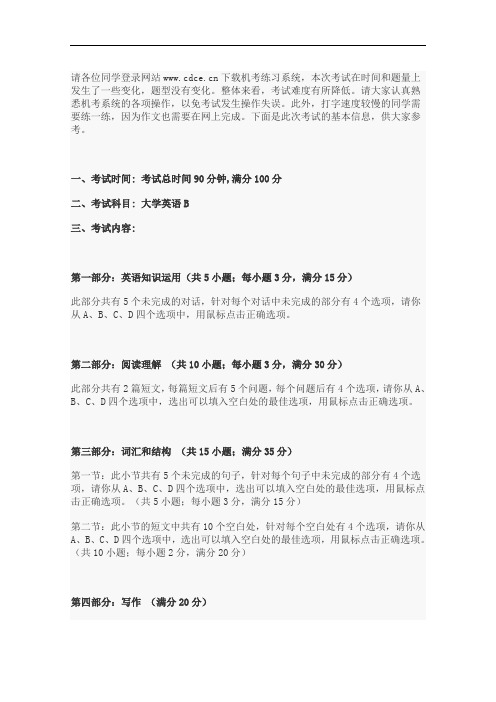
请各位同学登录网站下载机考练习系统,本次考试在时间和题量上发生了一些变化,题型没有变化。
整体来看,考试难度有所降低。
请大家认真熟悉机考系统的各项操作,以免考试发生操作失误。
此外,打字速度较慢的同学需要练一练,因为作文也需要在网上完成。
下面是此次考试的基本信息,供大家参考。
一、考试时间: 考试总时间90分钟,满分100分二、考试科目: 大学英语B三、考试内容:第一部分:英语知识运用(共5小题;每小题3分,满分15分)此部分共有5个未完成的对话,针对每个对话中未完成的部分有4个选项,请你从A、B、C、D四个选项中,用鼠标点击正确选项。
第二部分:阅读理解(共10小题;每小题3分,满分30分)此部分共有2篇短文,每篇短文后有5个问题,每个问题后有4个选项,请你从A、B、C、D四个选项中,选出可以填入空白处的最佳选项,用鼠标点击正确选项。
第三部分:词汇和结构(共15小题;满分35分)第一节:此小节共有5个未完成的句子,针对每个句子中未完成的部分有4个选项,请你从A、B、C、D四个选项中,选出可以填入空白处的最佳选项,用鼠标点击正确选项。
(共5小题;每小题3分,满分15分)第二节:此小节的短文中共有10个空白处,针对每个空白处有4个选项,请你从A、B、C、D四个选项中,选出可以填入空白处的最佳选项,用鼠标点击正确选项。
(共10小题;每小题2分,满分20分)第四部分:写作(满分20分)要求你在30分钟内,根据下面所给的题目用英语写出一篇不少于80词的短文。
四、注意事项:1.考生可以通过重做功能,重新初始化本题。
重新初始化后必须重新做本题,否则本题得分为0分。
2.考生在考试中应严格按照考试系统要求操作,不得擅自进行冷、热启动、复位、刷新网页及其他与考试无关的任何操作。
凡未按要求操作的,一切后果由考生自负;考试结束后,考生应按系统提示迅速离开考场。
《大学英语B》统考应试指导一、分析考试任何考试都有自身特点,考试前要求必须彻底了解考试的基本信息:包括考核目的、词汇量、题型设置、题量、考试时间以及形式等基本信息。
英语B级考试大纲
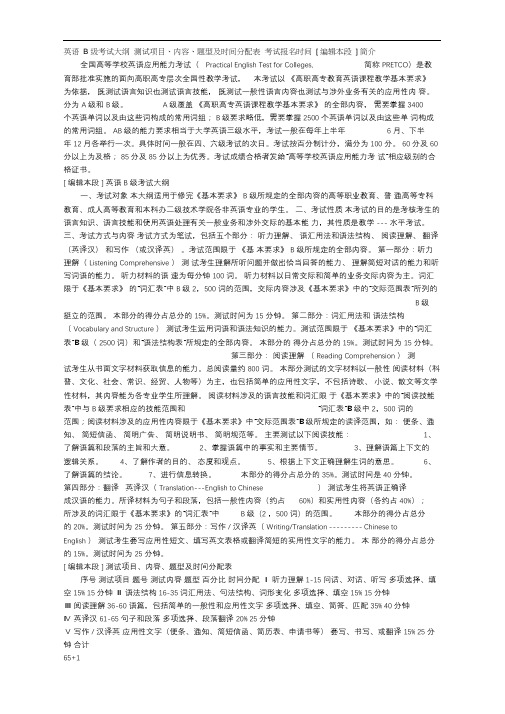
英语 B 级考试大纲测试项目、内容、题型及时间分配表考试报名时间[ 编辑本段] 简介全国高等学校英语应用能力考试(Practical English Test for Colleges, 简称PRETCO)是教育部批准实施的面向高职高专层次全国性教学考试,本考试以《高职高专教育英语课程教学基本要求》为依据,既测试语言知识也测试语言技能,既测试一般性语言内容也测试与涉外业务有关的应用性内容。
分为A级和B级。
A级覆盖《高职高专英语课程教学基本要求》的全部内容,需要掌握3400个英语单词以及由这些词构成的常用词组;B级要求略低,需要掌握2500 个英语单词以及由这些单词构成的常用词组。
AB级的能力要求相当于大学英语三级水平,考试一般在每年上半年 6 月、下半年12 月各举行一次。
具体时间一般在四、六级考试的次日。
考试按百分制计分,满分为100 分。
60 分及60 分以上为及格;85 分及85 分以上为优秀。
考试成绩合格者发给“高等学校英语应用能力考试”相应级别的合格证书。
[ 编辑本段] 英语B 级考试大纲一、考试对象本大纲适用于修完《基本要求》B 级所规定的全部内容的高等职业教育、普通高等专科教育、成人高等教育和本科办二级技术学院各非英语专业的学生。
二、考试性质本考试的目的是考核考生的语言知识、语言技能和使用英语处理有关一般业务和涉外交际的基本能力,其性质是教学--- 水平考试。
三、考试方式与内容考试方式为笔试,包括五个部分:听力理解、语汇用法和语法结构、阅读理解、翻译(英译汉)和写作(或汉译英)。
考试范围限于《基本要求》B 级所规定的全部内容。
第一部分:听力理解(Listening Comprehensive )测试考生理解所听问题并做出恰当回答的能力、理解简短对话的能力和听写词语的能力。
听力材料的语速为每分钟100 词。
听力材料以日常交际和简单的业务交际内容为主。
词汇限于《基本要求》的“词汇表”中B级2,500 词的范围,交际内容涉及《基本要求》中的“交际范围表”所列的B级挺立的范围。
2022年.9月电大-网络教育-远程教育-大学英语B统考-计算机网考

“计算机应用基础”考试大纲试点高校网络教育部分公共基础课全国统一考试,旨在遵循网络教育应用型人才旳培养目旳,针对从业人员继续教育旳特点,重在检查学生掌握基础知识旳水平及应用能力,全面提高现代远程高等学历教育旳教学质量。
“计算机应用基础”课程是现代远程教育试点高校网络教育实行全国统一考试旳部分公共基础课之一。
该课程旳考试是一种基础水平检测性考试,考试合格者应达到与成人高等教育本科相应旳计算机应用基础课程规定旳水平。
考试对象资料阐明:大学英语B 网考英语B 统考英语B 电大英语B 计算机应用基础(9月必备)合用范畴为各电视大学,远程教育学院,多种网络教育学院旳专升本考试,统一组织旳上机考试,题目随机从题库抽选,每年3次,4月,9月,12月第一部分交际英语(04月网考)全翻译版1.--Have a cup of tea, ________ ? 你需要来杯茶吗?--Thanks a lot. 非常感谢。
A don’t youB haven’t youC shall meD will you2.-- ________? 他怎么样?--He is not very well. 他不是较好。
A Who is heB What is heC How is heD Who he is3.—Why didn’t you come to my birthday party yesterday?昨天为什么不来参与我旳生日晚会?-- ________.不好意思,我太太出了个交通事故A Excuse me, my friend sent me a flowerB Fine, I never go to birthday partiesC Well, I don’t like birthday partiesD Sorry, but my wife had a car accident4.—This box is too heavy for me to carry upstairs.这个盒子对我来说太重了,搬不到楼上去--________ .让我帮你吧A You may ask for helpB I’ll give you a handC Please do me a favorD I’d come to help5. -Could I ask you a rather personal question? 我可以问您一种私人问题吗?-Of course, _________. 固然可以,开始A good ideaB that’s rightC never mindD go aheadKey: DCDBD6.—Oh, dear! I’ve just broken a window.噢天啊,我刚刚打破了一扇窗户。
全国高校网络教育大学英语统考(B)试题及答案
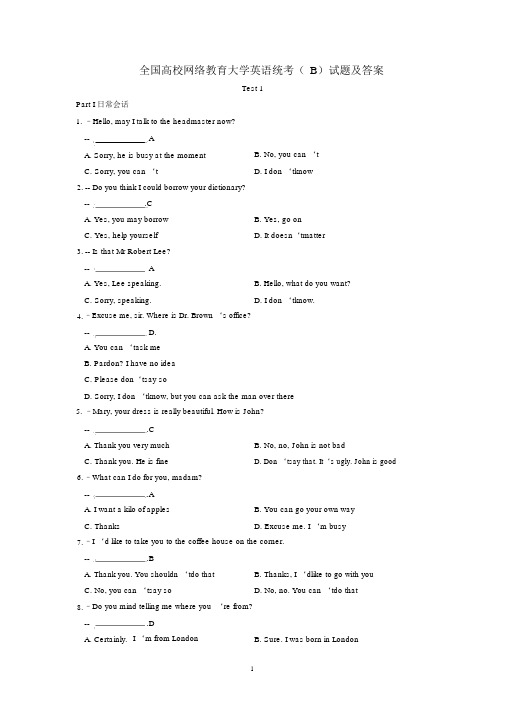
全国高校网络教育大学英语统考(B)试题及答案Test 1Part I 日常会话1. –Hello, may I talk to the headmaster now?--AA. Sorry, he is busy at the momentB. No, you can ‘tC. Sorry, you can ‘tD. I don ‘tknow2.-- Do you think I could borrow your dictionary?--.CA. Yes, you may borrowB. Yes, go onC. Yes, help yourselfD. It doesn‘tmatter3.-- Is that Mr Robert Lee?--AA. Yes, Lee speaking.B. Hello, what do you want?C. Sorry, speaking.D. I don ‘tknow.4.–Excuse me, sir. Where is Dr. Brown ‘s office?-- D.A. You can ‘task meB. Pardon? I have no ideaC. Please don‘tsay soD. Sorry, I don ‘tknow, but you can ask the man over there5. –Mary, your dress is really beautiful. How is John?--.CA. Thank you very muchB. No, no, John is not badC. Thank you. He is fineD. Don ‘tsay that. It‘s ugly. John is good6.–What can I do for you, madam?--.AA. I want a kilo of applesB. You can go your own wayC. ThanksD. Excuse me. I ‘m busy7.–I ‘d like to take you to the coffee house on the corner.--.BA. Thank you. You shouldn ‘tdo thatB. Thanks, I ‘dlike to go with youC. No, you can ‘tsay soD. No, no. You can ‘tdo that8.–Do you mind telling me where you‘re from?--.DA. Certainly.I ‘m from LondonB. Sure. I was born in LondonC. Not really, you can do itD. Certainly not. I ‘m from London9. –May I see the menu, please?--CA. That is the menu, sir.B. Yes, please go on.C. Here you are, sir.D. Of course, sir.10. –I was worried about chemistry, but Mr Brown gave me an A !--.BA. Don ‘tworry about itB. Congratulations! That ‘s a difficult courseC. Mr Brown is very goodD. Good luck to you!Part I I阅读理解Passage 1There are stories about two U.S. presidents, Andrew Jackson and Martin Van Buren, which attempt to explain the American English term OK. We don‘tknow if either story is true, but they are both interesting.The first explanation is based on the fact that President Jackson had very little education. In fact, he had difficulty reading and writing. When important papers came to Jackson, he tried to read them and then had his assistants explain what they said. If he approved of a paper, he would write ―all correct‖on it. The problem was that he didn ‘tknow how to spell, so what he really wrote was ―ol korekt ‖. After a while, he shortened that term to ―OK‖.The second explanation is based on the place where President Van Buren was born, Kinderhook, New York. Van Bruen‘s friends organized a club to help him become President. They called the club the Old Kinderhook Club, and anyone who supported Van Buren was called―OK‖.11.The author C .A. believes both of the storiesB. doesn‘tbelieve a word of the storiesC. is not sure whether the stories are trueD. is telling the stories just for fun12.According to the passage, President Jackson D.A. couldn ‘tdraw up any documents at allB. didn ‘tlike to read important papers by himselfC. often had his assistants sign documents for himD. wasn ‘tgood at reading, writing or spelling13.According to the first story, the term ―OK ‖C.A. was approved of by President JacksonB. was the title of some official documentsC. was first used by President JacksonD. was an old way to spell ―all correct ‖14.According to the second story, the term ―OK ‖D.A. was the short way to say ―Old Kinderhook Club‖B. meant the place where President Van Buren was bornC. was the name of Van Buren ‘s clubD. was used to call Van Buren ‘s supporters in the election15.According to the second story, the term ―OK ‖was first used B.A. by Van BurenB. in a presidential electionC. to organize the Old Kinderhook ClubD. by the members of the ―Old Kinderhook Club ‖Passage 2Although the United States covers so much land and the land produces far more food thanthe present population needs, its people are by now almost entirely an urban society. Less than a tenth of the people are engaged in agriculture and forestry( 林业 ), and most of the rest live in or around towns, small and large. Here the traditional picture is changing: every small town may stillbe very like other small towns, and the typical small town may represent a widely accepted view of the country, but most Americans do not live in small towns any more. Half the population now lives in some thirty metropolitan areas(large cities with their suburbs ) of more than a millionpeople each –a large proportion than in Germany or English, let alone France. The statistics( 统计 ) of urban and rural population should be treated with caution because so many people who live in areas classified as rural travel by car to work in a nearby town each day. As the rush to live out of town continues, rural areas within reach of towns are gradually filled with houses, so that it is hard to say at what moment a piece of country becomes a suburb. But more and more the typical American lives in a metropolitan rather than a small town environment.16.If now America has 250 million people, how many of them are engaged in agriculture andforestry?CA. About 25 million.B. More than 25 millionC. Less than 25 millionD. Less than 225 million17.Which of the following four countries has the smallest proportion of people living inmetropolitan areas?CA. the United States.B. GermanyC. France.D. England18.What‘s the meaning of the word ―metropolitan ‖in the middle of the passage?AA. Of a large city with its suburbs.B. Of small and large towns.C. Of urban areas.D. Of rural areas.19.According to the passage, what can we learn about small towns in the United States?BA.Most small towns become gradually crowded.B.Small towns are still similar to each other.C.As the traditional picture is changing, towns are different.D.Small towns are turning into large cities.20.Why is it hard to say when a piece of country becomes a suburb?CA.Because they are the same.B.Because the rush takes place too quickly.C.Because the process is gradual.D.Because more and more Americans live in metropolitan areas.Passage 3If we were asked exactly what we were doing a year ago, we should probably have to saythat we could not remember. But if we had kept a book and had written in it an account of whatwe did each day, we should be able to give an answer to the question.It is the same in history. Many things have been forgotten because we do not have any written account of them. Sometimes men did keep a record of the most important happenings in their country, but often it was destroyed by fire or in a war. Sometimes there was never any written record at all because the people of that time and place did not know how to write. For example, we know a good deal about the people who lived in China 4,000 years ago, because they could write and leave written records for those who lived after them. But we know almost nothing about the people who lived even 200 years ago in central Africa, because they had not learned to write.Sometimes, of course, even if the people cannot write, they may know something of the past. They have heard about it from older people, and often songs and dances and stories have been made about the most important happenings, and these have been sung and acted and told for many generations. For most people are proud to tell what their fathers did in the past. This we maycall ?remembered history ‘.Some of it has now been written down. It is not so exact or so valuable to us as written history is, because words are much more easily changed when used again and again in speech than when copied in writing. But where there are no written records, such spoken stories are often very helpful.21.Which of the following ideas is not suggested in the passage?DA.―Remembered history‖, compared with written history, is less reliable.B.Written records of the past play the most important role in our learning of the human history.C.A written account of our daily activities helps us to be able to answer many questions.D. Where there are no written records, there is no history.22.We know very little about the central Africa 200 years ago because D.A. there was nothing worth being written down at that timeB. the people there ignored the importance of keeping a recordC. the written records were perhaps destroyed by a fireD. the people there did not know how to write23.―Remembered history ‖refers to D.A. history based on a person ‘s imaginationB. stories of important happenings passed down from mouth to mouthC. songs and danced about the most important eventsD. both B and C24.―Remembered history ‖is regarded as valuable only when B.A. it is written downB. no written account is availableC. it proves to be trueD. people are interested in it25. The passage suggests that we could have learned much more about our past than we do now ifthe ancient people had A.A. kept a written record of every past eventB. not burnt their written records in warsC. told exact stories of the most important happeningsD. made more songs and dancesPart I I I语法与词汇选择题26. Jean did not have time to go to the concert last night because she wasbusy C for her examination.A. to prepareB. to be preparedC. preparingD. being prepared27. The computer doesn‘twork well. Something C wrong.A. can have goneB. should have goneC. must have goneD. ought to have gone28. Although Mary is satisfied with her success, she wonders C will happen to her privatelife.A. howB. whoC. whatD. that2 9. T h e c o n c er t us u a l l y t ak es p l ac e a t t he P eo p l e ‘s S q uar e, w i t ht h eaudience B on the ground.A. seatingB. seatedC. be seatingD. to seat30. If the whole program D beforehand, a great deal of time and money would have beenA. was not plannedB. were not plannedC. would not be plannedD. had not been planned31.Isn‘tit about the time you A to do morning exercises?A. beganB. beginC. should beginD. have begun32.I am very grateful to you for what you‘ve given me and D you have done for me.A. whichB. thatC. all whatD. all that33.It was not until she had arrived home B remembered her appointment with the doctor.A. when sheB. that sheC. and sheD. she34.Determined to A as if everything were normal, he responded with a kind of indifference.A. carry onB. account forC. bring upD. get through35.He C to arrange a loan through a finance company.A. triedB. succeededC. managedD. endeavored36.Jack is good, kind, hard working and intelligent., I can ‘tspeak too highly of him.A. As a resultB. In a wordC. By the wayD. On the contrary37.I going to the doctor , but I wish I hadn‘t.A. pick outB. make outC. give offD. put off38.Young children often can ‘t between TV programs and commercials.A. separateB. distinguishC. compareD. contrast39.The morning paper a story about demonstrations in New York and Washington D.C.A. carriedB. extendedC. broughtD. took40.And what we have got to is a disgrace.A. come up withB. catch up withC. put up withD. keep up withPart IV.完形填空You will find that college classes are very different from high school classes. You will have more work and responsibilities without being pushed as much.41, you will have more freedom –freedom to choose what to study, when to study, or42 to study. You will need to exercise maximum self-discipline. This is the hardest kind of discipline because it is self-imposed( 志愿的 ), and you have only yourself to43 . The decisions you make44 your study habits will be a45factor in your success, or lack of success in college.46, you will discover that your instructors47the ones you have had previously. They will expect you to48more48in your study habits and time management. Remember that much of your learning takes place outside the classroom. Your instructor willgive you additional help outside of class if there is evidence that you are putting maximum effortinto course.49 your abilities and skill mastery, you will need to manage your time effectively in order to succeed in college. A schedule 50efficient use of time will enable you to include both work and play. When you get a job, you will soon discover that you do not work only when you wish and as you wish. (221 words)41.A. On the other hand B. On the one handC. NeverthelessD. Therefore42.A. if B. whether C. why D. who43.A. turn to B. answer to C. respond to D. act as44.A. of B. to C. towards D. concerning45.A. determining B. demanding C. deciding D. depending46.A. However B. Nevertheless C. In addition D. Except that47.A. differ from B. are similar to C. differ in D. are alike48.A. take ⋯ part B. throw ⋯ yourself C. plunge ⋯ yourself D. take⋯ initiative49.A. In spite of B. ConcerningC. Regardless ofD. On the condition of50.A. related to B. carried on C. relied on D. based onTest 2Part I日常会话1. –Would you like to have dinner with us this evening?--.A. OK, but I have to go to a meeting nowB. No, I can ‘tC.I ‘dlove to, but this evening I have to go to the airport to meet my parentsD.I don ‘tknow2. –Hi, is Mary there, please?--A. Hold on. I ‘llget her.C. Yes, she lives here.3. –Please help yourself to the fish.--.A. Thanks, but fish doesn ‘tagree with meB. Sorry, I ca n‘thelpC. I don ‘tlike fish B. No, she isn ‘there.D. Yes, what do you want?D. No, I can ‘t4.–Hurry up, please, or I ‘llbe late.--.A. Sorry sir, but the traffic is thick nowB. Well, it ‘s alright, sirC. How can you say that, sir?D. Oh, we are going the right way5.–Excuse me, but can you tell me the way to the airport?--.A. Don ‘task thatB. Sorry, I ‘m a stranger hereC. No, I can ‘tsay thatD. No, you ‘re driving too fast6.–How about going to the cinema tonight, Jane?--.A. I don ‘tthink soB.I ‘m sorry. I have to drive my mother home tonightC.Never mindD.Take it easy7.–Are you ready to order desert, please?--.A. Yes, pleaseB. Please don‘torder itC. No, don ‘tmention itD. Yes, I ‘d like to have some chocolate cake8.–Did Tom tell you to water the flowers?--.A. No. And so did IB. No. And neither did IC. He did. And so I didD. He did. And so do I9.–Shall we sit up here on the grass or down there near the water?--.A.I ‘drather stay here if you don ‘tmindB.Sorry, I don ‘tlike neitherC.Certainly, why not?D.Yes, we like these two places10.–Would you mind changing seats with me?--.A. Yes, you canB. Of course, I like toC. No, I don ‘tmindD. Certainly, please doPart I I阅读理解Passage 1When Mrs. Joseph Groeger died recently in Vienna, Austria, people asked the question, ―Why did she live to be 107?‖Answers were provided by a survey conducted among 148Viennese men and women who had reached the age of 100. Somewhat surprising was the fact that the majority had lived most of their lives in cities. In spite of the city ‘s image as an unhealthy place, city living often provides benefits that country living can lack. One factor seems to be important to the longevity of those interviewed.This factor is exercise. In the cities it is often faster to walk short distances than to wait for a bus. Even taking public transportation often requires some walking. Smaller apartment houses have no elevators, and so people must climb stairs. City people can usually walk to local supermarkets. Since parking spaces are hard to find, there is often no alternative to walking.On the other hand, those who live in the country and suburbs do not have to walk every day. In fact, the opposite is often true. To go to school, work, or almost anywhere else, they must ridein cars.11. The Vienna survey may help to explain.A. the complaints of people in apartment housesB. the cause of Mrs. Groeger ‘s deathC. the longevity of people like Mrs. GroegerD. the image of cities in general12. The purpose of the second paragraph is to list some.A. benefits of walkingB. occasions for walking in city lifeC. comments made by city peopleD. problems of city living13. To reach the third floor of a building, it would probably be most healthful.A. to take the elevatorB. to walk up the stairsC. to ride in a carD. to find an alternative to walking14. People who live in the country probably do more driving than walking because.A. they don ‘tlive near business areasB. they don ‘tneed the exerciseC. they never have parking problemsD. they can ‘tafford to take the bus15. A conclusion that can be drawn from this passage is that.A. air pollution is not seriousB. anyone can live to be 107C. country people should move to the cityD. walking is healthful exercisePassage 2For any Englishman, there can never be any discussion as to who is the world ‘s greatest dramatist. Only one name can possibly suggest itself to him: that of William Shakespeare. EveryEnglishman has some knowledge, however slight, of the work of our greatest writer. All of us use words, phrases and quotations from Shakespeare ‘s writings that have become part of the common property of the English-speaking people. Most of the time we are probably unaware of the source of the words we used, rather like the old lady who was taken to see a performance of Hamlet and complained that it was full of well- known proverbs and quotations.Shakespeare, more perhaps than any other writer, makes full use of the great resources of the English language. Most of us use about five thousand words in our normal use of English; Shakespeare in his works used about twenty-five thousand.There is probably no better way for a foreigner to appreciate the richness and variety of the English language than by studying the various ways in which Shakespeare used it. Such a study is well worth the effort (it is not, of course, recommended to beginners) even though some aspects of English usage, and the meaning of many words, have changed since Shakespeare‘s day.16. English people.A. have never discussed who is the world ‘s greatest dramatistB. never discuss any issue concerning the world ‘s greatest dramatistC. are sure who is the world ‘s greatest dramatistD. do not care who is the world ‘s greatest dramatist17. Every Englishman knows.A. more or less about ShakespeareB. Shakespeare, but only slightlyC. all Shakespeare‘s writingsD. only the name of the greatest English writer18.Which of the following is true?A. We use all the words, phrases and quotations from Shakespeare‘s writings.B.Shakespeare‘s writings have become the property of those who are learning to speakEnglish.C.It is likely to be true that people often do not know the origins of the words they use.D.All the words people use are taken from the writings of Shakespeare.19.What does the word ―proverb ‖mean?A. Familiar sayings.B. Shakespeare‘s plays.C. Complaints.D. Actors and actresses.20.Why is it worthwhile to study the various ways in which Shakespeare used English?A. English words have changed a lot since Shakespeare ‘s timeB.By doing so one can be fully aware of the richness of the English language.C.English words are now being used in the same way as in Shakespeare‘s timeD.Beginners may have difficulty learning some aspects of English usage.Passage 3Trees are useful to man in three very important ways: they provide him wood and other products; they give him shade; and they help to prevent drought ( 干旱 ) and floods.Unfortunately, in many parts of the world, man has not realized that the third of these services is the most important. In his eagerness to draw quick profit from the trees, he has cut them down in large numbers.Two thousand years ago, a rich and powerful country cut down its trees to build warships, with which to gain itself an empire. It gained the empire but, without its trees, its soil became bare and poor. When the empire fell to pieces, the country found itself faced by floods and starvation.Even where a government realizes the importance of a plentiful supply of trees, it is difficult sometimes to make the people realize this. They cut down the trees but are too careless to plant and look after new trees. So, unless the government has a good system of control, or can educate the people, the forests slowly disappear.This does not only mean that there will be fewer trees. The results are even more serious: for where there are trees, their roots break the soil up, allowing the rain to sink in, and also bind the soil. This prevents the soil from being washed away. But where there are no trees, the rain falls on hard ground and flows away on the surface, and this causes floods and the rain carries away the rich topsoil in which crops grow. When all the topsoil is gone, nothing remains but worthless desert.21.Trees are useful to man mainly in three ways,the most important of which is that theycan.A. keep him from the hot sunshineB. enable him to build warshipsC. make him draw quick profit from themD. protect him from droughts and floods22.It ‘s a great pity that.A. man is only interested in building empiresB. man is eager to profit from treesC. man hasn‘trealized the importance of trees to himD. man hasn‘tfound out that he has lost all trees23.Sooner or later the forests will disappear.A. unless a country has a plenty supply of treesB. unless people stop cutting down their treesC. unless all people are taught the importance of planting treesD. unless the government punishes those who cut trees instead of planting them24.The word ―bind ‖in Paragraph 5 means ―‖.A. to wash awayB. to make wetC. to make stay togetherD. to improve25.When there is a heavy rain, trees can help to prevent floods, as they can.A. keep rain from falling down to soft groundB. cause the soil to allow rainwater to sink inC. prevent the soil from being washed awayD. make the topsoil stick togetherPart I I I语法与词汇选择题26.TOEFL is a test for students native language is not English.A. thatB. of whomC. whoseD. which27.He told me how he had given me shelter and protection without which I of hunger.A. would be diedB. would dieC. would have diedD. will die28.This article deals with the natural phenomenon which most interesting to everyone.A. areB. isC. they areD. it is29.He studied hard in his youth,contributed to his great success in later life.A. thatB. itC. whatD. which30.The population of many Alaskan cities has doubled in the past three years.A. large thanB. as great asC. more thanD. as many as31.He‘s determined to finish the job long it takes.A. no matterB. howeverC. whereverD. whatever32.Hardly ever get a good job these days without a good education.A. people mightB. people canC. do peopleD. have people33.Nowhere else in the world more attractive scenery than in Switzerland.A. you can findB. is foundC. can you findD. has been found34.Children learn best by studying at their own.A. rateB. speedC. paceD. growth35.The committee is due to its report by the end of this year.A. releaseB. relieveC. relateD. retain36.She‘s an only child, but they didn ‘treally her.A. hurtB. damageC. spoilD. harm37.His parents him the opportunity to go to university.A. ignoredB. neglectedC. refusedD. denied38.all our efforts to save the school, the authorities decided to close it.A. As forB. BesidesC. ExceptD. Despite39. For a successful business, friendly and staff are essential.A. sufficientB. effectiveC. efficientD. respective40. To their new shampoo, they are selling it at half price for a month.A. progressB. proceedC. promoteD. proposePart IV.完形填空th He has been proclaimed ―the finest mind alive ‖, ―the greatest genius of the late 20century ‖, and ―Einstein ‘s heir(继承人)‖. Known to millions,41 , for his book A Brief History of Time(《时间简史》 ),Stephen Hawking is a star scientist in more ways than one. His gift42revealing the mysteries of the universe in a style that non-scientists can enjoy43Hawking an instant celebrity( 名人 )and his book a bestseller in both Britain and America. It has44 in the Guinness Book of Records for spending 184 weeks in The Sunday Times―top-ten ‖lists, and has sold more than five million copies worldwide---virtually unheard-of success for a science book.How did all this happen? How has a man45 is almost completely paralyzed (瘫痪 )andunable to speak46through a computer overcome these 47obstacles and achieved far more than most people ever dream of?Hawking says: ―I soon realized that the rest of the world won‘twant to know you if you‘rebitter or angry. You have to be48if you ‘re to get much sympathy or help.‖He goes on:―Nowadays, muscle power is obsolete (无用 ). What we need49mind power---and disable people are50good at that50anyone else.‖(250words)41.A. far and wide B. by far C. far and away D. so far42.A. of B. to C. for D. at43.A. is made B. has been made C. was made D. made44.A. earned a place B. achieved a fame C. made a name D. gained reputation45.A. whose B. who C. where D. which46.A. besides B. despite C. except D. aside from47.A. difficult B. incredible C. very D. surprising48.A. negative B. positive C. sensitive D. aggressive49.A. is B. is to C. are D. are to50.A. not so ⋯as B. as⋯as C. the same⋯as D. so⋯ thanTest 3Part I日常会话1.–Oh, sorry to bother you.--.A. That ‘s okayB. No, you can ‘tC. That ‘s goodD. Oh, I don ‘tknow2.–Good morning, Dr Johnson ‘s office. Can I help you?--.A. Speaking, pleaseB. I ‘dlike to make an appointment, pleaseC. Yes, go onD. No, you can ‘t3.–We are going to have a dancing party tonight. Would you like to join us?--.A.I ‘m afraid not. Because I have an appointment with my dentist tonightB.Of course not. I have no ideaC.No, I can ‘tD.That ‘s all set4.–Excuse me. I don ‘twant to interrupt you but ⋯--.A. Can I help you?B. Certainly, how dare you?C. It ‘s quite all rightD. Yes, you did5.–You have lovely children.--.A. No, no, no. They are notB. Oh, no, noC. You ‘re talking too muchD. Thanks6. Can I help you with your suitcase?--.A. I have no ideaB. No, no. I can carry it myselfC. That ‘s a good ideaD. Thank you. I can manage myself7. –Can you come over for dinner with us?--.A.I ‘dlike to but I have a meeting tonightB.It doesn ‘tmatterC.No, I don ‘tlikeD.Oh, that sounds well8.–Good night and thanks again.--.A. You can ‘tsay thatB. No, no. It ‘s what I can doC. How can you say that?D. Good night9. –Oh, I ‘m sorry. But I promise I ‘llbe careful next time.--.A. I t ‘s nothing at allB. Oh, never mind. It doesn ‘tmatterC. Thank youD. There are no questions10. –Could I use your dictionary for a moment?--.A. It ‘s wellB. It doesn ‘tmatterC. By all meansD. I have no ideaPart I I阅读理解Passage 1Dr. Harvey Gates, the noted scientist, might never have discovered the Kamron lizard( 蜥蜴)in Blovia, if it had not been for a childhood accident. As a boy, he was determined to become a baseball player, but when he broke his arm in practice at the age of fourteen and was forced to stay off the playing field for a while, he took notice of the natural world around him and liked what he saw.After he had recovered from his injury, he caught a squirrel and raised it as a pet. Soon he was bringing home snakes and other creatures from the woods near his school.In 1962, he entered Blakeford College and majored in biology. By 1966 he had received his Bachelor of Science degree and two years later at Drysdale University, he received his Doctor of Science degree. It was while he was doing field research for his doctoral studies in SouthAmerica in 1967 that he discovered and named the Kamron lizard. This animal was different from others of its kind in that it had only four toes on its front feet. In other respects, it was similar to others of the same family. It could change its color and go for long periods without food.11.Of the four statements, which one best indicates the author ‘s idea?A.Dr. Gates is a scientist who can always attract the public attention to his research.B.Dr. Gates is a very famous scientist, though he wanted to be a sportsman at first.C.Dr. Gates is a scientist who always carries a notebook with him wherever he goes.D.Dr. Gates is a very popular for his determination to become a baseball player.12. In the first paragraph of the passage, the phrase ―in practice ‖means ―‖.A. while doing some practical workB. while studying animalsC. while making up his mind to become a baseball playerD. while playing baseball13. In the second paragraph, the word ―creatures‖can best be replaced by ―‖.A. peopleB. thingsC. animalsD. living things14. It was that Dr. Gates discovered the Kamron lizard.A. after he had graduated from Drysdale UniverstityB. right after he had finished his study for the doctor‘s degreeC. after he had received his highest degree。
全国统考大学英语B(第3部分)词汇与结构2020年8月

第三部分:词汇与结构翻译版1.55个标成红色的题目,重点复习,得分值6分2.次重点为除红色外9月出现频率较高的题目,分值为4分,重点掌握内部资料请勿传播,复习本资料无需看其他额外资料,词汇结构虽然功在平时,但临考前的准备也必不可少,本部分考5题共10分,基础较差的先重点温习标注红色的55题。
-------- 以下红色1-55 需重点掌握,得分值6分,每5小题后面KEY为答案--------1.He driving me home, even though I told him I lived nearby.尽管我告诉他我就住在附近,但他仍然执意开车送我回家。
A.insisted on B.insisted at C.insisted that D.insisted in2.We came finally the conclusion that she has been telling lies all the time.我们最终得出的结论是她一直以来都在撒谎。
A.of B.into C.to D.at3.I won’t make the mistake next time. 下次我不会犯同样的错误了。
A.like B.same C.near D.similar4.He lives in the house where he was born. 他仍然住在他出生的那间房子里。
A.already B.yet C.still D.ever5.I am not used to speaking public. 我不习惯于当众演讲。
A.in B.at C.on D.toKEY: ACBCA6.This kind of material expands the temperature increasing. 这种材料随温度的升高而膨胀。
A.to B.for C.with D.at7.People at the party worried about him because no one was aware he had gone.晚会上的人都为他担忧,因为没人知道他去哪儿了。
2023年9月份远程网络教育大学英语B统考试题新版
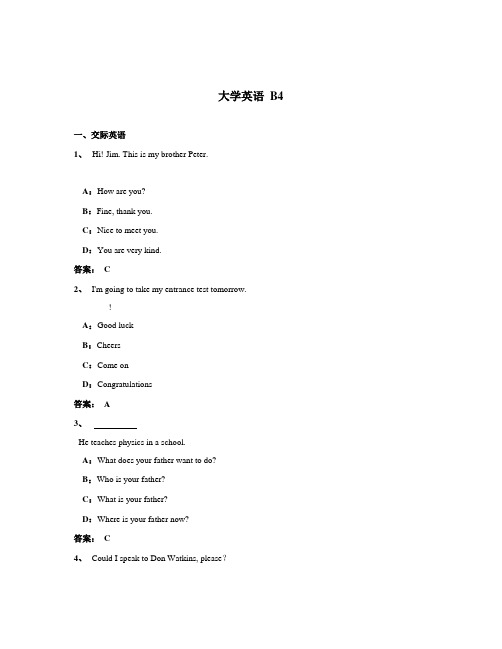
大学英语B4一、交际英语1、--Hi! Jim. This is my brother Peter.-- _________A:How are you?B:Fine, thank you.C:Nice to meet you.D:You are very kind.答案:C2、- I'm going to take my entrance test tomorrow.- _______!A:Good luckB:CheersC:Come onD:Congratulations答案:A3、-- He teaches physics in a school.A:What does your father want to do?B:Who is your father?C:What is your father?D:Where is your father now?答案:C4、- Could I speak to Don Watkins, please?- ________A:Speaking, please.B:Oh, how are you?C:I'm listening.D:I'm Don.答案: A电大、各类远程网络教育统考大学英语B、计算机应用基础权威辅导全套题库,100%通过,唯一QQ:5、-- Must I take a taxi?-- No, you ________ . You can take my car.A:had better toB:don'tC:must notD:don't have to答案: D二、阅读理解(共10小题;每题3分,满分30分)此部分共有2篇短文,在第一篇短文后有5个正误判断题,从每题后旳两个选项中选出对旳答案;在第二篇短文后有5个问题。
请从每个问题后旳A、B、C、D四个选项中选出对旳选项。
1、In 1920, barely out of his teens, Alfred Hitchcock went to work for an American film company which had opened a studio in Islington, London(19,十几岁旳阿尔弗雷德.希区柯克就为一家美国电影企业工作,这家企业在伦敦旳伊斯林顿有一种工作室). His first job at the studio was writing captions (脚本)for silent movies. Within two years, he was writing scripts(剧本)and working as an assistant director.For the rest of the 1920s, Hitchcock worked on one film after another in Britain and Germany. Filming was often a rough-and-ready(匆忙做成旳)affair and the assistant director was required to step in and plug gaps. A cameraman went missing, Hitchcock became a cameraman. A scene needed rewriting, Hitchcock rewrote it. Someone needed to be in charge of money when the film crew was onlocation, Hitchcock looked after the money.At the same time, this being the era of silent movies, Hitchcock was learning the language of cinema: telling a story-not through dialogue, but through visual images(视觉影象). This led to his success later.When he began to direct his own films, first in Britain and later in Hollywood, he was determined to make films that held the audience's attention and kept tension(紧张感). He succeeded. Hitchcock's ability to put you on the edge of your seat makes him one of the greatest makers of suspense(悬念)movies.(1)、Alfred Hitchcock's first job at the studio was writing captions for silent movies.A:TB:F答案:A(2)、According to the context, "step in and plug gaps" (in Line 3, Para. 2) means asking for one's help. A:TB:F答案:B(3)、Telling a story through dialogue prepared Hitchcock for his success later.A:TB:F答案:B(4)、He was determined to draw the audience's attention and keep tension in his film-making.A:TB:F答案:A(5)、He had taken up different jobs before he succeeded.A:TB:F答案:A2、Sixteen-year-old Maria was waiting in line at the airport in Santo Domingo(16岁旳玛丽亚正在圣多明哥旳机场排队等待). She was leaving her native country to join her sister in the United States. She spoke English very well. Though she was very happy she could go abroad, she was feeling sad at leaving her family and friends. As she was thinking all about this, she suddenly heard the airline employee asking her to pick up her luggage and put it on the scales (称). Maria pulled and pulled. The bag was too heavy and she just couldn't lift it up. The man behind her got very impatient. He, too, was waiting to check in his luggage."What's wrong with this girl?" He said, "Why doesn't she hurry up?" He moved forward and placed his bag on the counter, hoping to check in first. He was in a hurry to get a good seat.Maria was very angry, but she was very polite. And in her best English she said, "Why are you so upset? There are enough seats for everyone on the plane. If you are in such a hurry, why can't you give me a hand with my luggage?"The man was surprised to hear Maria speak English. He quickly picked up her luggage and stepped back. Everyone was looking at him with disapproval.(1)、Maria's story happened _______A:when she was leaving AmericaB:on her way back to Santo DomingoC:before she left the USAD:when she arrived at the airport答案:D(2)、You believe that the work of the airline employee mentioned in the story is to ______ at the airport.A:help carry people's luggageB:ask people to pick up the luggageC:check people's luggageD:take care of people's luggage答案:C(3)、"Why are you so upset?" Maria said to the man. She wanted to tell him that he should not be_____.A:surprised and worriedB:sad and angryC:unhappy and worriedD:sad and sorry答案:C(4)、"Everyone was looking at him with disapproval."This sentence means that the people around felt ____.A:worried about MariaB:worried about the manC:sorry for Maria's mannersD:sorry for the man's manners答案:D(5)、The author mentioned Maria's age at the beginning of the story in order to show that _____ .A:she was young but behaved properlyB:she would not have left home aloneC:everyone around her was wrongD:it was not good that nobody offered to help her答案: A三、词汇与语法1、Charlie thinks money will ______ all his problems.A:scoreB:solveC:forceD:perform答案:B2、Suzan speaks English _______John.A:so fluently asB:as fluent asC:more fluent thanD:much more fluently than答案:D3、______ the War of Independence, the United States was an English colony.A:BeforeB:AtC:InD:Between答案:A4、A police officer claimed he had attempted to ____ paying his fare.A:avoidB:rejectC:refuseD:neglect答案:A5、You shouldn't _______ your time like that, Bob; you have to finish your school work tonight. A:cutB:doC:killD:kick答案: C四、完型填空(共5个空;每个空2分,满分10分)如下短文中共包括5个未完毕旳句子,针对每个句子中空缺部分,请从A、B、C、D、E五个选项中选出对旳选项。
- 1、下载文档前请自行甄别文档内容的完整性,平台不提供额外的编辑、内容补充、找答案等附加服务。
- 2、"仅部分预览"的文档,不可在线预览部分如存在完整性等问题,可反馈申请退款(可完整预览的文档不适用该条件!)。
- 3、如文档侵犯您的权益,请联系客服反馈,我们会尽快为您处理(人工客服工作时间:9:00-18:30)。
网考大学英语B统考题
型及分值
Document serial number【KK89K-LLS98YT-SS8CB-SSUT-SST108】
2014年12月大学英语B统考?题型及分值
第一部分:交际用语(共5小题;每小题3分,满分15分)
此部分共有5个未完成的对话,针对每个对话中未完成的部分有4个选项,请从A、B、C、D四个选项中选出正确选项。
第二部分:阅读理解(共10小题;每小题2分,满分20分)
此部分共有2篇短文,第一篇短文后有5个问题。
请从每个问题后的A、B、C、D四个选项中选出正确选项。
第二篇短文后有5个正、误判断题,请选择T或F.
第三部分:词汇与结构(共5小题;每小题2分,满分10分)此部分共有5个未完成的句子,针对每个句子中未完成的部分有4个选项,请从A、B、C、D四个选项中选出正确选项。
第四部分:完型填空(共5小题;每小题3分,满分15分)
以下短文中共包含5个未完成的句子,针对每个句子中空缺部分有5个选项,请从A、B、C、D、E五个选项中选出正确选项。
第五部分:英译汉(满分30分, 5 each)
6句英文翻译成中文。
第六部分:写作(满分10分)
根据所给的题目和中文提纲用英语写出一篇不少于80词的短文。
